Difference between revisions of "Sega Mega Drive/Hardware revisions"
From Sega Retro
m |
|||
| (30 intermediate revisions by 12 users not shown) | |||
| Line 1: | Line 1: | ||
| + | {{back}} | ||
| + | {{cleanup}} | ||
| + | |||
==Model 1== | ==Model 1== | ||
{{sectionsNewStart|imagewidths=320px}} | {{sectionsNewStart|imagewidths=320px}} | ||
{{SectionsNew | {{SectionsNew | ||
| name=VA0 (JPN) | | name=VA0 (JPN) | ||
| − | | image= | + | | image=Mega_Drive_JPN_VA0.png |
| desc=Components: | | desc=Components: | ||
| Line 18: | Line 21: | ||
Due to a last-minute issue with the VDP in H40 mode, additional clock circuitry had to be added during manufacturing. This circuitry is present on a daughterboard in the center of the PCB, and contains the master oscillator (53.6931 MHz, NTSC), a 74LS74 (dual D-type flip-flops), and two 74LS161s (4-bit counter). | Due to a last-minute issue with the VDP in H40 mode, additional clock circuitry had to be added during manufacturing. This circuitry is present on a daughterboard in the center of the PCB, and contains the master oscillator (53.6931 MHz, NTSC), a 74LS74 (dual D-type flip-flops), and two 74LS161s (4-bit counter). | ||
| + | |||
| + | An issue in the hardware causes the RAM memory to not completely initialize when the game starts, causing crashes in ''[[Osomatsu-kun Hachamecha Gekijou]]''. | ||
}} | }} | ||
{{SectionsNew | {{SectionsNew | ||
| Line 27: | Line 32: | ||
*Z80 CPU: Zilog Z0840004PSC | *Z80 CPU: Zilog Z0840004PSC | ||
*Z80 memory: NEC D4168C-20 (8Kx8 XRAM, 200 ns) | *Z80 memory: NEC D4168C-20 (8Kx8 XRAM, 200 ns) | ||
| − | *I/O chips: Sega 315-5308, Sega 315-5309, Sega 315- | + | *I/O chips: Sega 315-5308, Sega 315-5309, Sega 315-5339 (DIP-16) |
*VDP: Sega 315-5313 (Yamaha YM7101) | *VDP: Sega 315-5313 (Yamaha YM7101) | ||
*Video RAM: 2x HM53461ZP-12 (64Kx4 VRAM 120 ns) | *Video RAM: 2x HM53461ZP-12 (64Kx4 VRAM 120 ns) | ||
| Line 55: | Line 60: | ||
| image=Genesis_1_VA_3_Serial_No_-_31X21232.jpg | | image=Genesis_1_VA_3_Serial_No_-_31X21232.jpg | ||
| desc=Components: | | desc=Components: | ||
| − | *M68K CPU: Motorola | + | *M68K CPU: Motorola MC68000P8 |
*M68K memory: 2x HM65256BL-10 (32Kx8 PSRAM, 100 ns) | *M68K memory: 2x HM65256BL-10 (32Kx8 PSRAM, 100 ns) | ||
*Z80 CPU: Zilog Z0840004PSC | *Z80 CPU: Zilog Z0840004PSC | ||
*Z80 memory: KM6264BL-10 (8Kx8 SRAM, 100 ns) | *Z80 memory: KM6264BL-10 (8Kx8 SRAM, 100 ns) | ||
| − | *I/O chips: Sega 315- | + | *I/O chips: Sega 315-5309, Sega 315-5364 |
*VDP: Sega 315-5313 (Yamaha YM7101) | *VDP: Sega 315-5313 (Yamaha YM7101) | ||
*Video RAM: KM424C64Z-10, VKF015 (64Kx4 VRAM) | *Video RAM: KM424C64Z-10, VKF015 (64Kx4 VRAM) | ||
| Line 66: | Line 71: | ||
*FM synthesizer: Yamaha YM2612 | *FM synthesizer: Yamaha YM2612 | ||
*Capacitors : Taicon, Chhsi | *Capacitors : Taicon, Chhsi | ||
| + | }} | ||
| + | {{SectionsNew | ||
| + | | name=VA4 (JPN) | ||
| + | | image=SegaMegadriveVA4Board.jpg | ||
| + | | desc=Components: | ||
| + | *M68K CPU: Signetics SCN68000C8N64 | ||
| + | *M68K memory: 2x TC51832SP-12 | ||
| + | *Z80 CPU: Zilog Z0840004PSC | ||
| + | *Z80 memory: NEC D4168C-15-SG | ||
| + | *I/O chips: Sega 315-5364, Sega 315-5309 | ||
| + | *VDP: Sega 315-5313 (Yamaha YM7101) | ||
| + | *Headphone amp: Sony CXA1034P | ||
| + | *Video encoder: Sony CXA1145P | ||
| + | *FM synthesizer: Yamaha YM2612 | ||
}} | }} | ||
{{SectionsNew | {{SectionsNew | ||
| Line 85: | Line 104: | ||
{{SectionsNew | {{SectionsNew | ||
| name=VA5 (JPN) | | name=VA5 (JPN) | ||
| − | | image=IC BD M5 | + | | image=Mega Drive PCB IC BD M5 VA5.jpg |
| desc= | | desc= | ||
}} | }} | ||
{{SectionsNew | {{SectionsNew | ||
| name=VA6 (JPN) | | name=VA6 (JPN) | ||
| − | | image=IC BD M5 | + | | image=Mega Drive PCB IC BD M5 VA6.jpg |
| − | | desc= | + | | desc=The first Japanese revision with the [[TradeMark Security System|TMSS]]. |
}} | }} | ||
{{SectionsNew | {{SectionsNew | ||
| Line 109: | Line 128: | ||
}} | }} | ||
{{SectionsNew | {{SectionsNew | ||
| − | | name=VA6 (PAL) | + | | name=VA6.5 (PAL) |
| image=MD1_IC_BD_M5_PAL_VA6.jpg | | image=MD1_IC_BD_M5_PAL_VA6.jpg | ||
| − | | desc= | + | | desc=The unused female DE-9 port (used for the [[Mega Modem]] in Japan) is removed. |
}} | }} | ||
{{SectionsNew | {{SectionsNew | ||
| name=VA6.8 | | name=VA6.8 | ||
| − | | image= | + | | image=Model_v6.8.jpg |
| desc= | | desc= | ||
}} | }} | ||
| Line 121: | Line 140: | ||
| name=VA7 (USA) | | name=VA7 (USA) | ||
| image=PC BD M5 USA VA7.jpg | | image=PC BD M5 USA VA7.jpg | ||
| − | | desc= | + | | desc=Components: |
| + | *M68K CPU: Motorola MC68HC000FN8 | ||
| + | *M68K memory: 2x 65256BLFP-10T | ||
| + | *Z80 CPU: Zilog Z0840004PSC | ||
| + | *Main ASIC: Sega 315-5487-01 | ||
| + | *Headphone amp: BA10324AF | ||
| + | *Video encoder: Sony CXA1145M | ||
| + | *FM synthesizer: Yamaha YM2612 (ASIC YM3438) | ||
| + | |||
| + | This revision is similar to the VA0 revision of the Model 2, in which it has a different M68K CPU and memory chips, as well as the main ASIC and audio amplifiers. The only difference is the Z80 CPU, which is in the same design used with the rest of the Model 1 revisions. | ||
| + | |||
| + | A function on the VDP (integrated into the ASIC) has broken PAL 50Hz support. | ||
}} | }} | ||
|} | |} | ||
| Line 128: | Line 158: | ||
{{sectionsNewStart|imagewidths=320px}} | {{sectionsNewStart|imagewidths=320px}} | ||
{{SectionsNew | {{SectionsNew | ||
| − | | name=VA0 ( | + | | name=VA0 (JPN) |
| image=MD2 JAPAN PCB VA0 UP.jpg | | image=MD2 JAPAN PCB VA0 UP.jpg | ||
| − | | desc= | + | | desc=The YM2612 is now based on the YM3438, and is integrated into the main ASIC (the Sega 315-5487-10). |
}} | }} | ||
{{SectionsNew | {{SectionsNew | ||
| Line 136: | Line 166: | ||
| image=PC BD MD2 VA0 PAL.jpg | | image=PC BD MD2 VA0 PAL.jpg | ||
| desc= | | desc= | ||
| + | }} | ||
| + | {{SectionsNew | ||
| + | | name=VA0 (USA) | ||
| + | | image=PC BD MD2 VA0 USA.jpg | ||
| + | | desc=Components: | ||
| + | *M68K CPU: Hitachi HD68HC000CP8 | ||
| + | *M68K memory: Toshiba TC51832AFL-10 | ||
| + | *Z80 CPU: Toshiba 84C00AU-6 | ||
| + | *Main ASIC: Sega 315-5487-01 | ||
| + | *Video Encoder: Samsung KA2195D | ||
| + | *Amplifier: Texas Instruments 311223J | ||
}} | }} | ||
{{SectionsNew | {{SectionsNew | ||
| Line 151: | Line 192: | ||
*Main ASIC: Sega 315-5660 | *Main ASIC: Sega 315-5660 | ||
*Video Encoder: Fujitsu MB3514 | *Video Encoder: Fujitsu MB3514 | ||
| + | *Amplifier: BA10324AF | ||
| + | }} | ||
| + | {{SectionsNew | ||
| + | | name=VA1.8 (USA) | ||
| + | | image=Genesis_2_PCB_VA1.8_serail_040169192.jpg | ||
| + | | desc=PCB Printed by SKS | ||
| + | Components: | ||
| + | *M68K CPU: Motorola MC68HC000FN8 | ||
| + | *M68K memory: [[Sanyo]] LC36648ML-10 | ||
| + | *Z80 CPU: Toshiba 84C00AU-6 | ||
| + | *Main ASIC: Sega 315-5660-02 | ||
| + | *Video Encoder: Samsung KA2195D | ||
*Amplifier: BA10324AF | *Amplifier: BA10324AF | ||
}} | }} | ||
| Line 156: | Line 209: | ||
| name=VA1.8 (USA) | | name=VA1.8 (USA) | ||
| image=PC_BD_MD2_VA1.8_USA.JPG | | image=PC_BD_MD2_VA1.8_USA.JPG | ||
| − | | desc=Components: | + | | desc=PCB Printed by CMK |
| + | Components: | ||
*M68K CPU: Motorola MC68HC000FN8 | *M68K CPU: Motorola MC68HC000FN8 | ||
*M68K memory: [[Sanyo]] LC331632M-12 | *M68K memory: [[Sanyo]] LC331632M-12 | ||
| Line 184: | Line 238: | ||
*Z80 memory: [NUMBER PLEASE] (8Kx8 SRAM) | *Z80 memory: [NUMBER PLEASE] (8Kx8 SRAM) | ||
*Main ASIC: Sega 315-5660 | *Main ASIC: Sega 315-5660 | ||
| + | *Amplifier: BA10324AF | ||
}} | }} | ||
{{SectionsNew | {{SectionsNew | ||
| name=VA2 (USA) | | name=VA2 (USA) | ||
| image=PC BD MD2 VA2 USA.jpg | | image=PC BD MD2 VA2 USA.jpg | ||
| − | | desc= | + | | desc=Components: |
| + | *M68K CPU: Motorola MC68HC000FN12 | ||
| + | *M68K memory: Sanyo LC331632M-12 | ||
| + | *Z80 CPU: Zilog Z84C0006FEC | ||
| + | *Main ASIC: Sega 315-5786 | ||
| + | *Amplifier: Sega 315-5684 | ||
| + | *FM synthesizer: Yamaha YM2612 | ||
| + | |||
| + | This revision (along with the VA2.3) is the only Model 2 boards with a discrete YM2612 chip. | ||
| + | |||
| + | Additional circuitry is present on the daughterboard located on the PCB, with model number 171-6961A. | ||
}} | }} | ||
{{SectionsNew | {{SectionsNew | ||
| name=VA2.3 (USA) | | name=VA2.3 (USA) | ||
| image=PC BD MD2 VA2.3 USA.jpg | | image=PC BD MD2 VA2.3 USA.jpg | ||
| − | | desc= | + | | desc=Components: |
| + | *M68K CPU: Motorola MC68HC000FN12 | ||
| + | *M68K memory: Toshiba TC511632FL-10 (32Kx16 PSRAM, 100 ns) | ||
| + | *Z80 CPU: Zilog Z84C0006FEC | ||
| + | *Z80 memory: KM78128LG-7 (8Kx8 SRAM) | ||
| + | *Main ASIC: Sega 315-5685 | ||
| + | *Video Encoder: Sony CXA1645M | ||
| + | *Amplifier: Sega 315-5684 | ||
| + | *FM synthesizer: Yamaha YM2612 | ||
| + | |||
| + | This revision (along with the VA2) is the only Model 2 boards with a discrete YM2612 chip. | ||
}} | }} | ||
{{SectionsNew | {{SectionsNew | ||
| name=VA3 | | name=VA3 | ||
| image=PC_BD_MD2_VA3_USA_HAL.JPG | | image=PC_BD_MD2_VA3_USA_HAL.JPG | ||
| − | | desc= | + | | desc=Components: |
| + | *M68K CPU: Motorola MC68HC000FN12 | ||
| + | *M68K memory: ??? 651632DFP-15 | ||
| + | *Z80 CPU: Zilog Z84C0006FEC | ||
| + | *Main ASIC: Sega 315-5660 | ||
| + | *Video Encoder: Sony CXA1645M | ||
| + | *Amplifier: Sega 315-5684 | ||
}} | }} | ||
{{SectionsNew | {{SectionsNew | ||
| Line 210: | Line 291: | ||
*IC5: Sony CXA1645M video encoder | *IC5: Sony CXA1645M video encoder | ||
*IC6: 7805 voltage regulator | *IC6: 7805 voltage regulator | ||
| − | This is the first Mega Drive board without any discrete CPUs. Both the 68000 and Z80 are contained with the Sega 315-5960 ASIC, as well as the VDP, | + | This is the first Mega Drive board without any discrete CPUs. Both the 68000 and Z80 are contained with the Sega 315-5960 ASIC, as well as the VDP, YM3438, and I/O controllers. |
}} | }} | ||
|} | |} | ||
| Line 219: | Line 300: | ||
| name=VA1 (USA) | | name=VA1 (USA) | ||
| image=PC BD MD3 VA1 USA.jpg | | image=PC BD MD3 VA1 USA.jpg | ||
| − | | desc= | + | | desc=Components: |
| + | *IC1: Sega 315-5960 ASIC (see above) | ||
| + | *IC2: Sharp LH5P1632N-15 32Kx16 PSRAM | ||
| + | *IC5: OKI M54C864-80 512K (64K x 8-bit) VRAM | ||
| + | *IC6: Sony CXA1645M RGB Encoder | ||
| + | *IC7: TI LM324 amplifier | ||
| + | IC3 and IC4 markings are silkscreened but don't correspond to any physical ICs. | ||
}} | }} | ||
{{SectionsNew | {{SectionsNew | ||
| Line 225: | Line 312: | ||
| image=PC_BD_MD3_VA2_USA.jpg | | image=PC_BD_MD3_VA2_USA.jpg | ||
| desc=Components: | | desc=Components: | ||
| − | *Main ASIC: Sega 315-6123 (contains M68K, Z80, VDP, | + | *Main ASIC: Sega 315-6123 (contains M68K, Z80, VDP, YM3438, and probably some other components.) |
*Memory (right of main ASIC): NEC D4502161G5 (128Kx16 SDRAM) | *Memory (right of main ASIC): NEC D4502161G5 (128Kx16 SDRAM) | ||
*Oscillator (bottom-right of main ASIC): SG53 PTR S 53.6931M | *Oscillator (bottom-right of main ASIC): SG53 PTR S 53.6931M | ||
*Video Encoder (bottom-left of main ASIC): Sony CXA1645M | *Video Encoder (bottom-left of main ASIC): Sony CXA1645M | ||
*Amplifier (left of main ASIC): TI 85AFTRF LM324 | *Amplifier (left of main ASIC): TI 85AFTRF LM324 | ||
| + | |||
| + | The <tt>tas</tt> function of the M68K (which was broken in prior revisions) has been fixed in this revision, making some games such as ''[[Gargoyles]]'' unplayable. | ||
}} | }} | ||
|} | |} | ||
[[Category:Mega Drive hardware]] | [[Category:Mega Drive hardware]] | ||
Latest revision as of 13:47, 4 December 2023
- Back to: Sega Mega Drive.
| This article needs cleanup. This article needs to be edited to conform to a higher standard of article quality. After the article has been cleaned up, you may remove this message. For help, see the How to Edit a Page article. |
Model 1
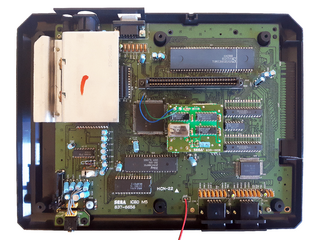
|
VA0 (JPN) |
|---|---|
Components:
Due to a last-minute issue with the VDP in H40 mode, additional clock circuitry had to be added during manufacturing. This circuitry is present on a daughterboard in the center of the PCB, and contains the master oscillator (53.6931 MHz, NTSC), a 74LS74 (dual D-type flip-flops), and two 74LS161s (4-bit counter). An issue in the hardware causes the RAM memory to not completely initialize when the game starts, causing crashes in Osomatsu-kun Hachamecha Gekijou. | |
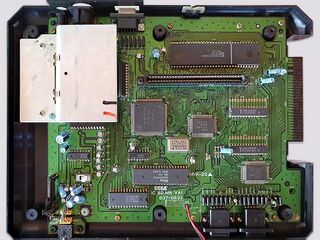
|
VA1 (JPN) |
Components:
| |
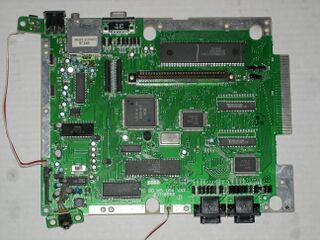
|
VA2 (USA, High Definition Graphics) |
Components:
| |

|
VA3 (USA, High Definition Graphics) |
Components:
| |
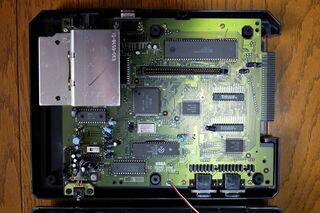
|
VA4 (JPN) |
Components:
| |
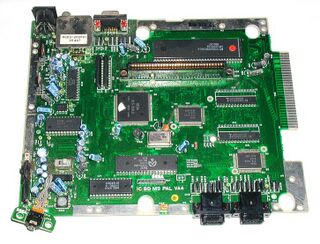
|
VA4 (PAL) |
Components:
| |
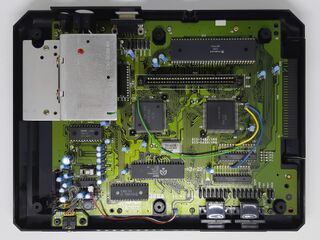
|
VA5 (JPN) |
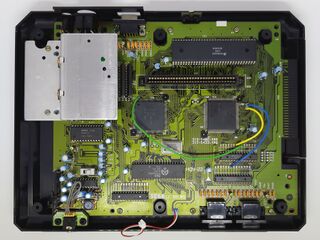
|
VA6 (JPN) |
| The first Japanese revision with the TMSS. | |
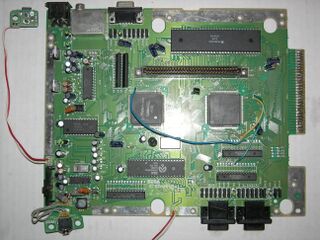
|
VA6 (USA, High Definition Graphics) |
Components:
| |
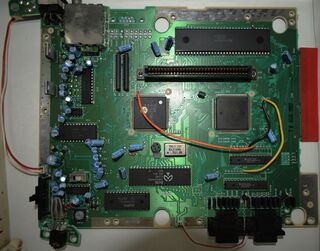
|
VA6.5 (PAL) |
| The unused female DE-9 port (used for the Mega Modem in Japan) is removed. | |
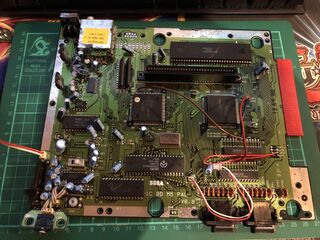
|
VA6.8 |
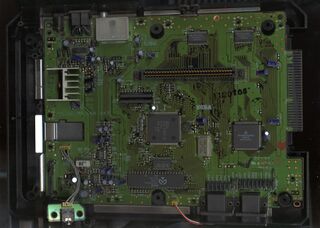
|
VA7 (USA) |
Components:
This revision is similar to the VA0 revision of the Model 2, in which it has a different M68K CPU and memory chips, as well as the main ASIC and audio amplifiers. The only difference is the Z80 CPU, which is in the same design used with the rest of the Model 1 revisions. A function on the VDP (integrated into the ASIC) has broken PAL 50Hz support. |
Model 2
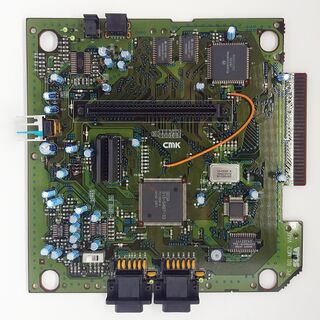
|
VA0 (JPN) |
|---|---|
| The YM2612 is now based on the YM3438, and is integrated into the main ASIC (the Sega 315-5487-10). | |
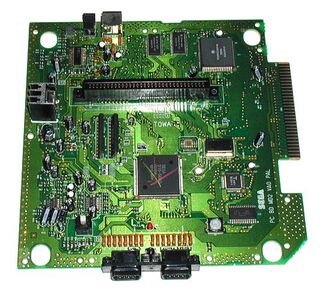
|
VA0 (PAL) |
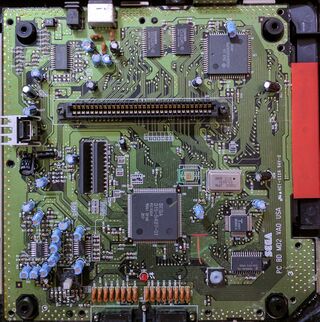
|
VA0 (USA) |
Components:
| |
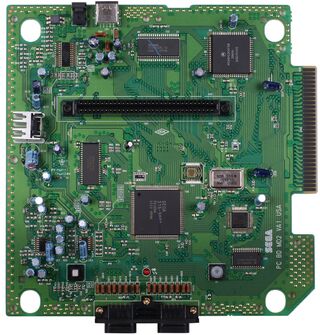
|
VA1 (USA) |
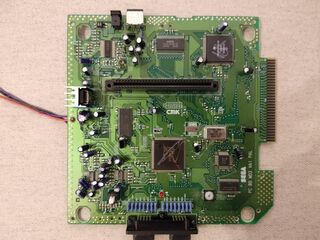
|
VA1 (PAL) |
Components:
| |
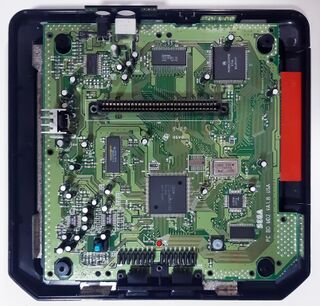
|
VA1.8 (USA) |
| PCB Printed by SKS
Components:
| |
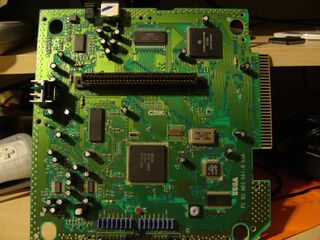
|
VA1.8 (USA) |
| PCB Printed by CMK
Components:
| |
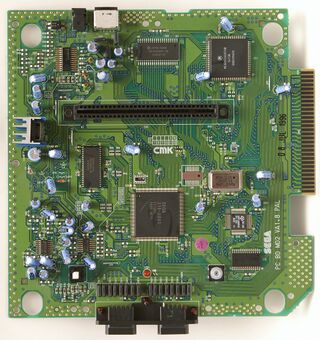
|
VA1.8 (PAL) |
Components:
| |
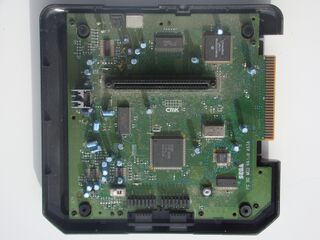
|
VA1.8 (Asia) |
Components:
| |
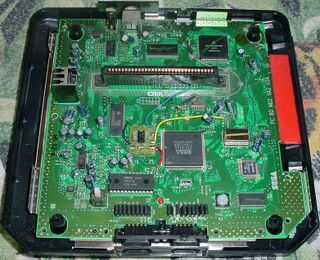
|
VA2 (USA) |
Components:
This revision (along with the VA2.3) is the only Model 2 boards with a discrete YM2612 chip. Additional circuitry is present on the daughterboard located on the PCB, with model number 171-6961A. | |
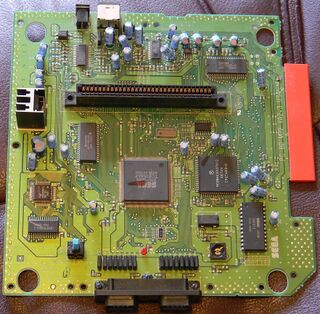
|
VA2.3 (USA) |
Components:
This revision (along with the VA2) is the only Model 2 boards with a discrete YM2612 chip. | |
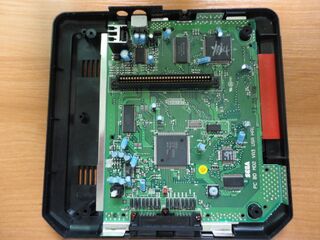
|
VA3 |
Components:
| |
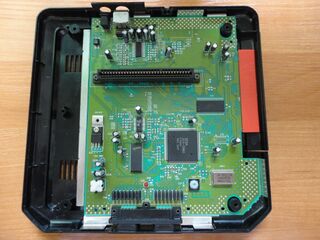
|
VA4 |
Components:
This is the first Mega Drive board without any discrete CPUs. Both the 68000 and Z80 are contained with the Sega 315-5960 ASIC, as well as the VDP, YM3438, and I/O controllers. |
Model 3
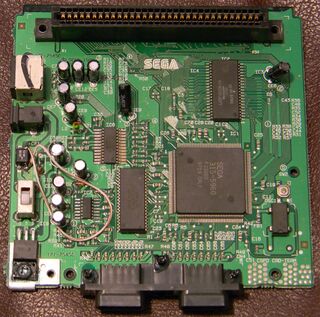
|
VA1 (USA) |
|---|---|
Components:
IC3 and IC4 markings are silkscreened but don't correspond to any physical ICs. | |
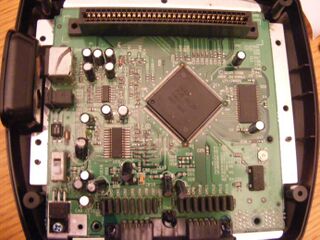
|
VA2 (USA) |
Components:
The tas function of the M68K (which was broken in prior revisions) has been fixed in this revision, making some games such as Gargoyles unplayable. |